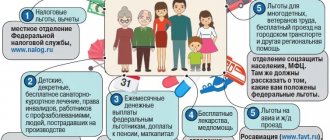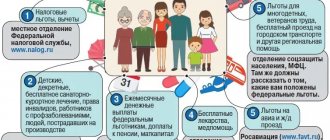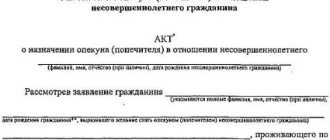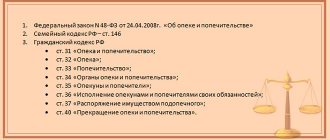For the category of people with physical or mental health problems, assistance from third parties is required both in everyday life and when representing interests in various structures and government bodies. One of the forms of providing such assistance is guardianship over a group 2 disabled person. A special feature of the process is the category of disability: if a person has retained legal capacity and does not suffer from mental illness, it is concluded that there is no need to formalize guardianship. In such a situation, the practice of foster care is widely used.
Who are group 2 disabled people?
Disabled people in Russia are people who, due to health reasons, cannot fully carry out their life activities in society and need protection and assistance. According to the law “On Social Protection of Disabled Persons in the Russian Federation,” the presence of diseases is determined by a special medical institution. The procedure for such identification is established by the Government.
There are three groups of disabilities in total. People in the first group have a very serious illness and need constant care. The second group is recognized for those persons who have severe or moderate illnesses. It is assumed that such a person can serve himself at least partially. The third group includes disabled people without loss of ability to work.
It is very difficult to obtain the first disability group, so most people who have survived a serious illness receive the second group. Their ability to carry out any activity is severely limited. Often these people require additional care and attention.
Kinds
Guardianship may be assigned:
- Over people of different ages: over adults and elderly people with disabilities; over children with disabilities.
- Over citizens with various ailments: disabled since childhood; with complete incapacity; with injuries resulting in limitations in physical capabilities.
Also, types of guardianship differ in the method of payment. Help for a disabled person can be:
- gratuitous (without any payment for these duties);
- paid (here it is necessary to submit documents to receive federal and regional payments).
Patronage is considered a separate form of guardianship. This is partial assistance to a person with disabilities. In this case, his assistant performs exclusively those functions that the ward is not able to cope with himself. For example, when registering foster care, an assistant signs papers for blind and visually impaired citizens.
A civil contract for the provision of services with a detailed description of the responsibilities of the parties is concluded with the trustee.
Only full guardianship can be granted to an incapacitated person.
Who can be a guardian
Any person who wishes to care for the patient and meets certain criteria can obtain guardianship over a disabled person.
Requirements
Russian legislation establishes the following requests for those who can be a guardian for a group 2 disabled person:
- Legal capacity and majority.
- No criminal convictions against the person. The candidate's biography should not contain criminal histories involving crimes against the person.
- The person must be healthy and have a certificate of absence of contagious diseases and other violations that interfere with the implementation of guardianship.
- Absence in the biography of facts of non-compliance with the conditions of guardianship and previous deprivation of the right of a guardian.
There are no other requirements for a guardian.
Rights and responsibilities of a guardian
The responsibilities of a guardian for a group 2 patient include providing care, caring for the health of the ward and carrying out assignments stipulated by the concluded contract. The main tasks that guardianship solves when patronizing a disabled person of group 2 are everyday issues: purchasing various products, helping with housekeeping.
A citizen who has guardianship over a patient has the right to care for the ward and choose clinics for the treatment of the ward. The rights of the assistant may include representing the interests of the ward in court and other government organizations. In addition, the guardian has the right to receive government payments from the relevant authorities.
Can a guardian work for an incapacitated parent?
If a person is declared completely incompetent, the guardianship authority is obliged to find a guardian for the disabled person. Usually the executor is a close relative, the son or daughter of an elderly person. In this case, the assistant, regardless of whether he works or not, is obliged to care for the person entrusted to him and take care of his health. Some may think, “If I am the guardian of an incapacitated disabled person, then I need to quit my job.” Please note that such guardianship may be free of charge. If the guardian wants to receive state care benefits, then he will have to quit his job. An exception is the payment of 1,200 rubles if the ward is over 80 years old.
Guardianship concept
People with physical and mental disabilities most often need control and additional care, since they themselves are not able to lead a full life.
Citizens in need of guardianship include not only disabled people whose physical abnormalities are recognized by a medical examination, but also people recognized by the court as incompetent.
A guardian is, in fact, a protector of all the rights and interests of his ward.
The following are the main responsibilities of people who agree to take custody of a disabled person:
- caring for him;
- management of his movable and immovable property;
- taking care of his health (physical and moral).
Registration of guardianship most often occurs by decision of the head of the municipality where the incapacitated citizen lives. In some cases, when it comes to disability due to mental illness, a court decision is required.
A disabled person can have only one guardian, no more. All activities of the guardian are strictly controlled by local governments and guardianship authorities
How to obtain guardianship over a group 2 disabled person in Russia
Registration of guardianship is carried out over a disabled person in accordance with the procedure determined by the Government. Two applications are submitted to the guardianship authority at the patient’s place of residence. One thing is that the future guardian agrees to provide assistance to the patient and become a guardian for a group 2 disabled person. The second is that the ward has no objections to this candidacy. Copies of passports and documents for registration of guardianship over a disabled person are attached to the applications. A decision on the issue is made within 15 days and is valid for two years.
Where to contact
To register guardianship of a disabled person, you should contact directly the guardianship and trusteeship authority at the place of registration of the disabled person. Usually the department is located in the administration of a locality or district.
Required documents
From the person seeking guardianship:
- information from the place of work about his income;
- certificate from the hospital in form 164/у-96;
- brief autobiographical information;
- certificate of no criminal record (you can get a certificate at the MFC);
- consent of family members to guardianship.
The ward will be required to:
- certificate of the presence and degree of disability;
- information about the pension, confirmed by a certificate from the pension fund);
- extract from the house register.
Requirements for a guardian to receive disability payments
Loan secured by PTS CashDrive, Person. No. 18-034-75-009039
from 0.05%
rate per day
up to 1 million
90 – 2,555 days
Take out a loan
Payment for caring for a disabled person can be issued to a person who meets a number of conditions:
- Work ability. A person should not be of retirement age or have the status of a disabled person of any group.
- At least 16 years of age. From this age, a citizen officially becomes able-bodied.
- Lack of income. Payments for caring for a disabled person are assigned only to a non-working person. Also, he should not receive pensions, benefits or other regional or state payments.
- Place of residence in the same locality as the incapacitated citizen (it is not necessary to live in the same living space as the person under guardianship).
If at least one of these conditions is not met, registration will be denied.
Payments and benefits
Someone will be interested in how much a disabled person’s guardian receives, what benefits and payments he has. After registration of guardianship, the person caring for a disabled person of group 2 is entitled to payment only in certain cases. The monthly benefit will be 1,200 rubles if the elderly person under care is over 80 years old. If care is provided for a disabled child, then payments to the caregiver will amount to 5,500 rubles. In other cases, there are no payments from the state, but benefits are provided that are common to all cases.
A person who provides patronage for a disabled person has the right to a 50% discount when paying for housing and communal services, to benefits when traveling on public transport and to some benefits when paying for education.
Partial and full guardianship
The state has provided several types of assistance for this category, namely:
— patronage or partial guardianship is provided for persons who need help in solving certain everyday issues, but no more;
— full guardianship is assigned to completely incapacitated people, for example, when a disabled person has mental disorders that interfere with normal self-care, etc.
In this case, the degree of legal capacity of a person with disabilities is established by the court after filing an application (this can be done by relatives of the disabled person or employees of the medical institution where the patient is observed). Based on the decision made, the appropriate type of guardianship is determined.
A medical examination of a disabled person is carried out in court, based on the results of which conclusions are formulated about the legal capacity of the person being examined. If the court has approved guardianship, the relevant document will be received by the authorities no later than 3 days, and then a guardian will be appointed to the disabled person within a month.
Monitoring the performance of duties
Control over the performance of guardians of their duties is carried out by employees of the body responsible for guardianship and trusteeship in the region, and other social services. After establishing patronage, this body can initiate checks on the ward. During the inspection, the living conditions of the disabled person are assessed, the availability of adequate nutrition, the number of items for hygiene services, and a conversation is held with the ward. If facts of violations are revealed, then the question of how to make guardianship over a disabled person of group 2 better, or how to deprive him of guardianship, can be considered.
Nuances of patronage and guardianship
Patronage is guardianship over a legally capable person who agrees to this measure. Guardianship of this kind is based on the conclusion of a trust agreement or assignment, so the guardianship authorities have nothing to do with it. The document specifies the obligations and rights of the parties, and also states the possibility of terminating the contract at the request of the ward.
Guardianship allows you to control the behavior of these persons, but the right to make decisions and actions remains with the wards. The trustee supports, but cannot be the legal representative of the ward. At the same time, the person providing care is able to limit his actions if he does something illegal, etc.
When it comes to guardianship, it differs from conservatorship in some key terms. In particular, only adult and legally capable guardians are considered. They start with relatives, and if a suitable candidate is not found, they choose another person. As noted above, mentally ill people, persons with other disabilities, and those who have previously been deprived of parental rights are not admitted. Alcohol and drug addicts are excluded.
An important role is played by whether the guardian has a regular income. At the same time, Art. 37 of the Civil Code of the Russian Federation prohibits a guardian and members of his family from entering into transactions with a ward with a material component. And according to Art. 32 of the Civil Code of the Russian Federation, a guardian has the right to fully represent the interests and rights of incapacitated people, children under 14 years of age and mentally ill people. Older citizens with special needs (from 14 years of age) receive guardians if they are found incompetent during a trial.
Grounds for termination
Guardianship is not a lifelong status. Article 29 of the Federal Law of the Russian Federation No. 48 establishes certain conditions under which it is terminated:
- Due to the death of a ward.
- If the validity period of the order appointing a guardian has expired.
- When removed from duties by guardianship authorities.
The law establishes that the competent authority may terminate the regulation by its decision for the following reasons:
- The guardian expressed a personal desire for termination.
- The interests of the guardian and his ward turned out to be conflicting.
- If it is proven that the guardian performed the duties assigned to him in bad faith.
- Provided that the audit reveals facts of failure to take measures to preserve the property of a disabled person by the guardian.
If the released person does not agree with the decision of the guardianship authority, he has the right to challenge it through the court by filing a statement of claim.
Refusal to approve a candidacy
An unequivocal refusal will be given to persons who:
- Have been convicted;
- Provided knowingly false information;
- Deprived of parental rights;
- Do not meet the requirements provided by law.
If the alleged guardian is not satisfied with the refusal received, he has the right to appeal it within 10 days from the date of the decision. In such a situation, an appeal is written and sent to the appeal department of the regional court.
Only the person who has received a refusal can write the paper.
Nuances associated with mental disorders
Declaring a person incompetent due to mental illness means that he needs mandatory permanent guardianship. Even if a citizen is able to take care of himself in everyday life, he no longer has the right to work in government agencies legally. His interests must be represented by a guardian. Guardianship of incapacitated people is appointed by the court.
The exception is cases when an incompetent disabled person of group 2 is admitted to a psychiatric hospital. In such situations, a guardian is not assigned to him because his legal interests are represented by hospital officials.
Benefit rate
When caring for a disabled child under 18 years of age, parents are paid 10,000 rubles. If a regional coefficient is in effect in the region, then the amount of assistance can increase to 20,000 (Letter of the Ministry of Labor of the Russian Federation dated 06/09/2003 No. 1199-16). Guardians of disabled adults receive an additional payment of 1,200 rubles.
Guardians are also entitled to the following benefits:
- Reimbursement of costs for housing and communal services – 50%.
- Once a year, vacation in a sanatorium with your ward.
- Discount on payment of land tax.
- Exemption from property tax (Article 407 of the Tax Code of the Russian Federation).
- Exemption from payment of transport tax (cars up to 200 hp).
Group I disabled people are also paid a disability pension. The incapacitated person's money is usually managed by a guardian.
Non-working able-bodied persons are paid 1200 rubles monthly. Residents of the Far North receive payments taking into account the regional coefficient (1.15-2). The money is accrued along with the pension of the disabled citizen.
Subjects of the Russian Federation may provide additional types of payments to families of disabled people. For example, clause 1.4 of the Moscow PP dated 12/16/2020 No. 2260-PP.
Registration procedure
The first step on the path to guardianship involves interacting with the court. Recognition of partial capacity or complete incapacity is required. Based on this, the further procedure is determined and the collection of documents with the choice of the form of guardianship: patronage or full care.
Court decision recognizing incapacity
Relatives of a disabled person, or representatives of social services (guardianship authorities), or medical institutions can initiate legal proceedings. The claim is accompanied by an extensive package of documents, including :
- certificates from doctors;
- documents establishing the relationship of the parties;
- personal documents;
- receipt with state duty.
The basis for making a decision to recognize a disabled person of group 1 as incompetent is an independent examination conducted by doctors. After the court ruling comes into force, further registration takes place in the guardianship authorities.
Candidate consideration
The time frame for consideration of the issue is limited in time - a guardian must be appointed within 30 days , and in the absence of one, completely incompetent citizens are sent to specialized institutions that will take care of the disabled person.
An applicant for guardianship applies to a government agency with a package of documentation for himself and his future ward:
- Civil passports of the parties.
- A certificate confirming the candidate’s stable income.
- Characteristics from the employer.
- Medical certificate confirming that the potential guardian has no health problems.
- A certificate indicating that a person has no criminal record.
- Multiple autobiography.
- If there are other family members, provide their written consent.
- An act carried out by representatives of the guardianship authorities to ensure that the housing complies with living standards.
- Certificate from the Pension Fund about the amount of pension paid.
- A document containing information about the pension received by a disabled person.
- Medical report on group assignment.
- Extract at the place of residence.
- A court ruling regarding a person's incapacitated status.
- Documentation for the property of a disabled person.
The submitted documents are submitted for consideration to the state authority to make a decision on the possibility of guardianship.
Features of registration of patronage
The easiest form of guardianship is patronage, which does not require permanent residence with a disabled person and ensuring full control over the person’s life and health.
The following requirements must be met when patronizing::
- Legal capacity (absence of confirmed incapacitated status).
- Consent of the ward (the candidate is selected from among relatives or strangers, excluding representatives of social services and other representatives of the law).
- The basis for providing assistance will be an agreement between the assistant and the ward.
An application for patronage is submitted by the person in need of help. It reflects the reason why the participation and care of other citizens was required (the deterioration of health is confirmed by a medical certificate).
A potential assistant is presented with documents confirming health, income, and availability of housing. They also take certificates from tuberculosis, drug and psychoneurological dispensaries.
Within a month, the possibility of appointing a guardian with further transfer of responsibilities for the ward is determined on the basis of an agreement, which lists the powers and a list of tasks of a domestic nature, and legal issues.
Patronage does not imply a separate additional benefit from the state. Payment for services is possible within the framework of an agreement concluded with a disabled person. After signing the agreement and the start of guardianship, employees of the supervisory authority reserve the right to regularly and periodically monitor the fulfillment of the obligations assigned to the guardian, and if violations are identified, to cancel guardianship.
If necessary, an assistant to a disabled person has the right to apply to the Social Insurance Fund for a specific payment for the time spent caring for the person. This period can be included in the length of service.
Popular questions and answers
Question:
What is the processing time for a guardianship application?
Answer:
The application must be reviewed within 30 days.
Question:
What are the reasons for denial of guardianship?
Answer:
Disagreement of the ward's relatives with the candidate, incomplete list of papers, criminal record and dependence of the candidate on alcohol (drugs), restriction of his rights.
Question:
Are there benefits for people combining work and care?
Answer
: A reduction in work shifts and an increase in vacation time, additional monthly days off and early retirement are labor preferences in this case.
Subjects of legal relations
Guardianship of a group 2 disabled person can be granted only after the citizen has been assigned such status. In accordance with Order of the Ministry of Social Development No. 1013\2009, the following limitations of abilities must be established for the person under guardianship:
- labor activity - the need to create special conditions for its implementation;
- self-service – a person requires outside help in solving a number of everyday issues;
- communication – a disabled person cannot fully contact other people, perceive and transmit information without outside participation;
- behavior control - requires the participation of third parties when in society;
- acquiring knowledge – the difficulty of perceiving and remembering the necessary skills and knowledge;
- orientation – a person cannot fully orientate himself in space and does not adequately perceive the surrounding reality.
The status of a guardian can be assigned not to anyone who wishes, but to a circle of persons who, without selfish motives, are able to fulfill the assigned obligations, including taking into account that the disability is due to mental illness. These are always capable persons who have reached the age of majority.
The candidacy of a guardian is considered from the standpoint of personal and moral qualities. Factors such as living conditions, health status, characteristics of relationships with other relatives, and the presence of a permanent job or other stable source of income must be taken into account.
A categorical taboo applies if the following facts are established:
- lack of permanent, stable income;
- having a criminal record for illegal actions encroaching on the life or health of others;
- non-compliance of the available living space with sanitary requirements and standards;
- alcohol or drug addiction, the presence of diseases that complicate or prevent full care.
Preference is given to close relatives, for example, guardianship of an elderly disabled person of group 2 is often formalized by children. But if there are none, or do not show a desire to take on obligations, a person from outside the family circle may be appointed as a guardian if all basic selection criteria are met.
Bottom line
The second group of disabilities involves the presence of restrictions that interfere with normal life. At the request of the applicant, he may be assigned a patronage guardian to assist him in everyday life and represent his interests in government agencies. If legal capacity is limited, a trustee is forcibly appointed through the court.
- home
- Guardianship
Article rating:
(votes: 1 , average rating: 5.00 out of 5)
Share with friends:
Add a comment
Click to cancel reply.
Popular material
Legislative regulation
Any limitation of physical or mental abilities entails some restrictions. A disabled person who loses the ability to move, self-care and control their actions needs outside help. It can be provided free of charge or for a fee. The second type of interaction involves establishing the legal fact of guardianship with all the accompanying consequences.
| Legislative acts regulating the issue | ||
| № | Name, date of adoption | Issues that are regulated |
| 181 | On the protection of disabled people, dated November 24, 1995 | Defines the concept of disability |
| Stipulates social guarantees for limited persons | ||
| 197 | Labor Code of the Russian Federation, dated December 30, 2001 | Establishes requirements for candidates, legal and mandatory parameters of the parties |
| Specifies the procedure | ||
Who is under guardianship?
Guardianship is established for persons with disabilities. These may be mental disorders and physical abnormalities. The mere fact of illness is not a sufficient reason. A court order declaring incapacity or an ITU conclusion on the determination of disability is required.
The presence of only physical limitations in a disabled person is the basis for establishing patronage care for him. The ward is not limited in legal capacity, which means he makes all decisions independently. The guardian only facilitates the implementation of the will of the disabled person.
If a court decision recognizes a disabled person as having limited rights, then the guardian has a wider range of rights. He not only cares, but also makes decisions for the ward. We are talking about the disposal of property and income of an incapacitated citizen.
Who has the right to obtain guardianship?
Since the guardian receives certain powers and responsibilities, certain requirements are imposed on his candidacy. The absence of selfish intentions and the ability to fulfill obligations are the main criteria that a candidate must meet.
Important!
A person who is competent in age and health can become a guardian.
Additional factors that are taken into account when considering a candidacy:
- personal qualities;
- health status;
- family relationships;
- living conditions;
- level of earnings;
- other circumstances that may affect the quality of care;
- family ties with the ward.
Preference is given to candidates who have family ties to the ward. But the law does not restrict third parties from such rights.
Restrictions:
- having a criminal record;
- alcohol, drug and other types of addiction;
- lack of income;
- restriction of rights, including parental rights;
- lack of a health certificate;
- limitation of legal capacity;
- the presence of serious illnesses that prevent normal care.
What does it mean to be a caregiver for a disabled person?
To be a guardian means to accept the responsibilities arising from these rights. The person undertakes to protect all rights of the incapacitated or disabled person. The right to manage the ward’s funds presupposes his accompanying provision of food, medicine, things and other components of a quality life.
Being a foster carer means helping your ward in everyday life. Buying food and medicine, paying utility bills and completing necessary errands, helping around the house - all these activities take place in agreement with the disabled person.








